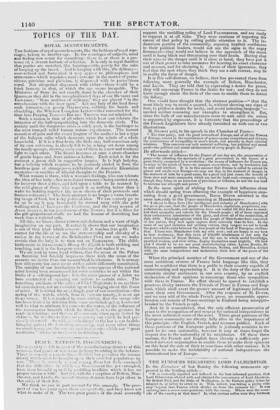TOPICS OF TIIE DAY.
ROYAL ACCOUCIIEMENTS.
THE fashions of royal accouchements, like the fashions of royal mar- riages, belong to another age. In the marriages of subjects, mind and feeling now count for something : there is, or there is a pre- tence of; a decent latitude of selection. It is only in royal families that parties are matched, like hunting-cattle, purely for the sake of keeping up the breed. :And in keeping with this, the delicacy- over-refined and fantastical it miy. appear to philosophers and statesmen—which regulates men's comiuet in the matter of partu- ritions, patrician and plebeian, is dispensed with in purists:toms royal. Not altogether dispensed with either—there would be a frank honesty in that, of which the age seems incapable. The Ministers of State do not exactly stand in the chamber of their Queen,as they did in the unsophisticated days of our llEsuuns and Enwattos: " from motives of delicacy," they are placed " in the antechamber with the door open." Let any lady of the land fancy such intrusion,—a gossip :NIEsnoutess, rubbing his hands and chuckling; the Windsor Complete Letter-writer converted for the time into Peeping Tom—But no Thomas was not admitted.
Such a season is that of all others whieh least can tolerate the intrusion of the half-sympathizing into the domestic circle. The anxiety until the dangerous crisis is safely past, is the harbinger to the most tranquil relief human nature experiences. The instant cessation of pain and the sweet languor of the mother is but a type of the halcyon calm which descends upon the minds of a whole household. If it is a first-born, the little one, half-conscious only of its own existence, is already felt to be a lamp set down among the family-groupe, showing every one of them in a new and tenderer light to each other. The future becomes at once a store. chamber of gentle hopes and fears unknown before. Each mind is for the moment a poem rich in suggestive images. It is high holyday, but a holyday which requires to be jealously circled in from the heedless gaze of strangers—a celebration of domestic Eleusinian mysteries—a sacrifice of blissful thoughts to the Penates. What woman is there, with a woman's feelings, who can tolerate the idea of her baby—her new-found treasure—being carried away, for however short a time, and laid upon a table to be scanned by the cold glance of those who regard it as nothing better than a wafer for holding together the loose sheets of their protocols and finance-estimates ? The little creature is no longer a warm breath- ing image of God, but a dry political idea. We can scarcely go so far as to say it may henceforth be stowed away withothe gold walking-stick of EDWARD the Confessor, and the ivory sceptre of ANNE Busesx, in the jewel-room of the Tower ; but it is fitter for the gilt-gingerbread cradle we had the honour of describing last week than a rational crib.
All this, we know, shows narrow-mindedness and a want of high imagination on our part. It certainly shows that our imagination is not of that kind which converts all it touches into gold. We cannot for the life of us see the statesmanship and chivalry of a nation in the heroes of the Bedchamber Plot; nor can we make Certain that the baby is to turn out all ELIZABETH. The child- birth-scene hi SIIAKSPERE'S Henry the L'ichllt is both striking and touching, but it is the foregone coeclusion that makes it so.
We are told by some loyal writers, that the scene at the Palace on Saturday last forcibly impresses them with the sense of the security we derive from our monarchical institutions. It is strange how differentiv the same event strikes minds differently constituted. The stability of our institutions is the consequence of the national mind having been accustomed for some centuries to act within the limits of a self-imposed law : it is the consequence of a habit we have contracted of squaring our actions to certain rules. The hereditary attribute of the oflice of Chief' Magistrate is an acciden- tal concomitant, not an essential agent in bringing about this frame of mind. It is withal the most fragile part of our constitution—the spring of the watch, which, from its estretne tenuity, in most apt to go wrong. It is reMarked by some author, that the savage who has been loadeti by drinking from sortie tieWeinal spring, knomvs not well to what to attribute his cure—to the water, or the influence of the moonbeams beneath ohielt he demi: it, or to the gestures be made ii drinking and that on thi. iccount, when again visited by siekric, he resolves to lear:: to ce.mnony out W !lid] he Ilad pre- viotoly observed. So with u,,----i,bedience to the law is our health- bringing spring; tin; hero:hi:1.y inwmrchy, and niany other things we could name, are the seasoes tost eeeemsnies v. tick our " great medicines'' advise us to m,bserve in drinking it.


























 Previous page
Previous page